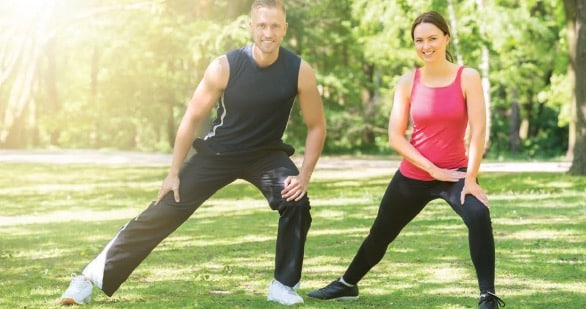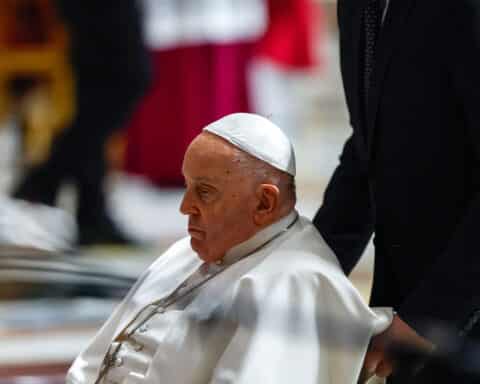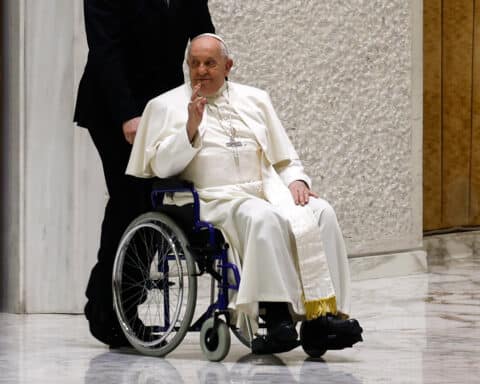Did you know that fitness and leading a healthy lifestyle provides us with great opportunities for virtue? It’s true. And, in fact, it’s my opinion that fitness is one of the most under-utilized opportunities we have to witness to the Faith.
God gives us a great opportunity to live out our values through our bodies on a daily basis, truly informing how we behave and interact with the world through the course of our lives.
St. Paul writes, “I drive my body and train it, for fear that, after having preached to others, I myself should be disqualified” (1 Cor 9:27). Now, St. Paul obviously is not writing about going to the gym, but undeniably he is talking about the integral connection between how he disciplines his body and how he works toward his salvation.
Discipline and mortification can be lived out in a variety of ways, such as fasting, cold showers and devotions, to name a few. But discipline and mortification also can directly affect our health and physical well-being, and can play a role in how we tend to our “temples of the Holy Spirit.”
Why, then, do we so infrequently regard getting fit as a spiritual activity? I think if we take a candid look, we simply fear making a commitment to what we’re sure will be long, difficult suffering with no end in sight.
Take this current season of Lent. Many of us make our Lenten resolutions the same way we’d make a New Year’s resolution. Don’t get me wrong, if chocolate or coffee or cigarettes are a millstone around your neck, get rid of them! But we have an opportunity during Lent (and beyond), to move toward the true integration of body and soul that God intends for us. St. Iranaeus said, “The glory of God is man fully alive.” He didn’t say, “The glory of God is man ignoring the body because the soul is the only important part.” He also didn’t say, “The glory of God is man with a killer bod.” In both our bodies and souls, we have the opportunity to master our base instincts, our lesser desires, and subdue our fallen nature. Don’t put your body in competition with your soul or vice versa. I’ve known Catholics who rationalize having cake and ice cream for dinner because “the physical is less important than the spiritual.” They run away from effort and physical activity with the reasoning: “God doesn’t care how I look.”
The other side of the coin is the people who can’t seem to find an hour on Sundays to make it to Mass, but easily find an hour daily to exercise. They fit in work, play and workouts without missing a beat, but with all that are “too busy” for God.
The truth is that both of these groups are doing the same thing most humans are best at: serving themselves.
In our lives, God allows us sufficient suffering to perfect us, and we need to accept that suffering, not run away from it. And while we’ll all experience heartbreak and tragedy that tries our souls along the way, more often our hearts and minds will experience the natural stress of daily living.
We get to offer both the big and small — the life-changing and the ordinary — to God.
God has given us bodies that need tending, that respond to exercise, that serve us better the more we put them into service. It won’t be easy, but it will be worth doing.
One caveat: If your workouts take you away from worshipping God, you miss the point. If you glorify the body to the detriment of your soul, you set up an opposition that shouldn’t exist, and you become less human, less fully alive and less of who you actually are.
Living for God and dying to self are challenging. But in Christ, we have an opportunity to offer every single suffering back to him, so that he can transform it to grow us, to change us and to bring us closer to him.
So don’t run away from suffering, especially the suffering that comes from doing the things that are good for us. Embrace it instead. Conquer your fear, laziness, anger, gluttony, lust — all the things that keep us incomplete — and master your body, mind and soul.
How do we get started?
There are four main components to fitness training, and each component provides great opportunities to mortify our bodies and strengthen our souls.
1) STRENGTH
From the beginning, the Book of Genesis tells us that God makes us in his own image, to share in the act of creation, to have dominion over the earth and subdue it (see Gn 1:26-28). God doesn’t give us any capacity or gift to be left unused.
As Jesus reveals in the parable of the talents (Mt 25:14-30), every repetition of good action builds up our ability to repeat good action in the future. Similarly, God created our bodies to respond to work and stress by growing stronger as well. We use our muscles every single minute of every single day, and if they are stronger, our physical lives will be easier, more relaxing and more enjoyable. Perhaps most often overlooked, strong muscles also actually help to prevent injuries that keep us from living the lives we want to live. This holds true in our spiritual lives as well, where the more we do the difficult thing of exercising strength of character, the easier it becomes, so that while temptations still occur, they don’t master us.
2) SPEED
Training your speed develops your ability to exert yourself at a high level for a short period of time. Physically, it recruits your lungs, your heart and your muscle fibers in ways that no other kind of training does. This, in turn, exponentially increases your efficiency in losing fat, changing your body composition and improving your cardiovascular function. And yet, almost no one does it! Fewer still do it correctly. Why? Perhaps because it’s very taxing. It goes against our desire for easy pleasure and our fear of hard work that we inherited from our original parents. Similarly, in the spiritual life, G.K. Chesterton tells us, “The Christian ideal has not been tried and found wanting, it has been found difficult and left untried.”
Experience has taught me that temptation and struggle most occur in my life right when great grace is around the corner. Each year when doing St. Louis de Montfort’s 33-day consecration, I’ll be darned I don’t feel totally dogged by the devil on Day 32. So whether you’re preparing for a sacrament like matrimony, holy orders or confirmation, or you’re undergoing a particularly challenging time, or even if you’re simply struggling through Lent right now, your ability to exert yourself at a high intensity in your faith life will open you up to the transformative grace God desires to give to you.
3) ENDURANCE
In Matthew 24 and 25, Jesus recounts teaching after teaching and parable after parable about being ready to meet your maker, whether on the Last Day or your last day. He says in Matthew 24:13, “The one who perseveres to the end will be saved.” In life, many of us will go through great difficulty or great trials that threaten to shake our faith in God and in humanity. But we will all experience the long, slow grind of the small difficulties of life much more. Training both muscular and cardiovascular endurance can exercise our patience, our resilience and our will as much as it exercises our legs and lungs.

4) FLEXIBILITY
To quote G.K. Chesterton again, “The virtues have gone mad because they have been isolated from each other and are wandering alone. Thus some scientists care for truth; and their truth is pitiless. Thus some humanitarians only care for pity; and their pity (I am sorry to say) is often untruthful.” To paint with a slightly broad spiritual brush, it can be common for men to hold on to truth at the expense of love and compassion, and for women to hold on to love deprived of truth. There’s an overrigidity on one side and an overindulgence on the other side. This can parallel the training of flexibility. Proper flexibility gives us the ability to stay healthy and fit our whole lives. It prevents injury and improves muscular function. Yet, men can tend to be overly focused on strength, thinking that stretching and flexibility are somehow a waste of time or can make them weak. On the other hand, women can focus so much on flexibility that they end up getting injured through hypermobility. Again this points to the deeper reality that openness and docility are great goods for our soul, so long as they are balanced with discipline in the context of truth.
‘The Training Trinity’
These four fitness components — strength, speed, endurance, flexibility — find their place as one part of “The Training Trinity,” which provides even more spiritual insight. “The Training Trinity” is the union of proper exercise (where all four fitness components live), rest and nutrition. Exercise without either proper nutrition or rest will only break down your muscles and body. Rest divided from either nutrition or exercise will leave you fat or atrophied. Proper nutrition without exercise still leads to a host of health problems. And without rest, you simply wear your body out.
1. Exercise: I won’t belabor the importance of exercise any more, but I will just say that doing things that are difficult, that embracing a cross and mortifying our flesh is good for us — body and soul.
2. Rest: Our bodies and souls need both rest and recovery if we want to grow and change for the better. The saints often speak of prayer as “resting in God,” and resting heals our muscles and refreshes the soul. I once received a great piece of advice in regards to combating both temptations to sins of acedia and lust (as well as a host of others): “Nothing good happens after midnight, go to bed before then and sleep 7 1/2 hours each night.” Now maybe some good things happen after midnight (I know some creative types who swear by late-night inspirations), but getting to bed on time and getting enough sleep puts you in a stronger place spiritually, so that temptations don’t look quite as appealing and you can rise above them more easily and actively choose the good.
3. Nutrition: To put our Catholic belief in the Eucharist in very colloquial terms, Catholics believe, “you are what you eat!” To put it in less colloquial terms, the Church Fathers (notably St. Irenaeus) talked about our “divinization,” where, “man, by entering into communion with the Word and thus receiving divine sonship, might become a son of God.” The fact is that the supernatural builds on the natural, so there is a natural cognate here, too: that what we feed our bodies truly provides the materials for maintaining our temple of the Holy Spirit. If we use sub-par building materials (to continue the metaphor), we give God less than his due. This doesn’t mean you have to eat fancy, sumptuous meals; Jesus certainly didn’t do that. But both your body and soul respond best to good, clean, healthy foods and the work it takes to prepare them.
One last thing to remember is that in addition to their individual benefits, all the parts of “The Training Trinity” provide one shared, simple, but incredibly important benefit that we so often forget: In taking care of our bodies, we show respect to the God who made us in his image and likeness, who has loved us so much that we are “wonderfully made” (Ps 139:14).
| A Daily Plan |
|---|
|
So what does this look like practically? Here are five easy steps:
Step One: Begin each day with gratitude to God for all the good things and all the challenging things (notice I didn’t call them “bad things?”) in your life.
Step Two: Offer God the work and sufferings of the day about to ensue.
Step Three: Do well the work you need to do (excel in your occupation), do good works (find opportunities for charity to others), and subdue your body by working out and eating well.
Step Four: Pray throughout the day, and examine the day so far to see how you’re doing on your end in your relationship to God and others.
Step Five: Plan the next day, and end the day by again praising and offering gratitude to God for both the good and the challenging in your life.
|
To find out more about diving deeper into a life that truly is an integration of body and soul, check out “Grit & Glory: Cross Training Your Body and Soul” (OSV, $16.95).
If any of this speaks to your mind or your heart or your soul (or, dare I say it, all three), I have a challenge for you. For the rest of Lent, follow the five-step plan above. When it comes to exercise, if you’re not accustomed to exercising regularly, I would challenge you to do just one exercise each day — to failure. What that means is you do it without stopping until you can’t do it any more. It will bring in almost every one of the fitness components, and will take three minutes or less each day, but will serve to start to build a habit of giving your body the activity it needs to thrive. For this purpose, I recommend doing push-ups one day (from your knees if you have to), pull-ups or towel rows the next day, and squats the third day. On the fourth day, start over with push-ups again.
Kaiser Johnson is the author of “Grit and Glory: Cross Training Your Body and Soul” (OSV, $16.95).





